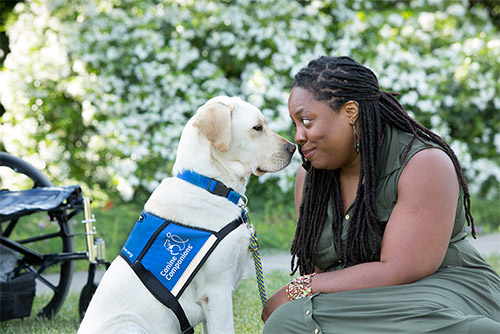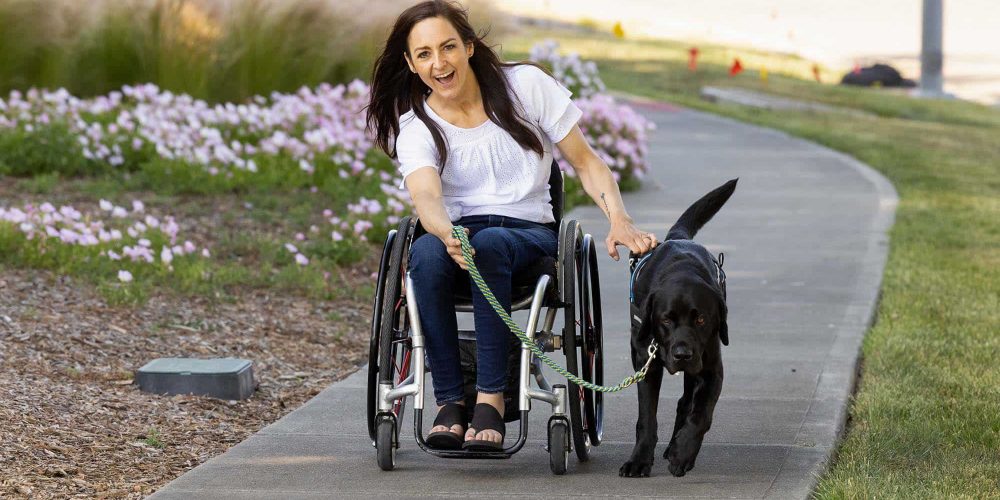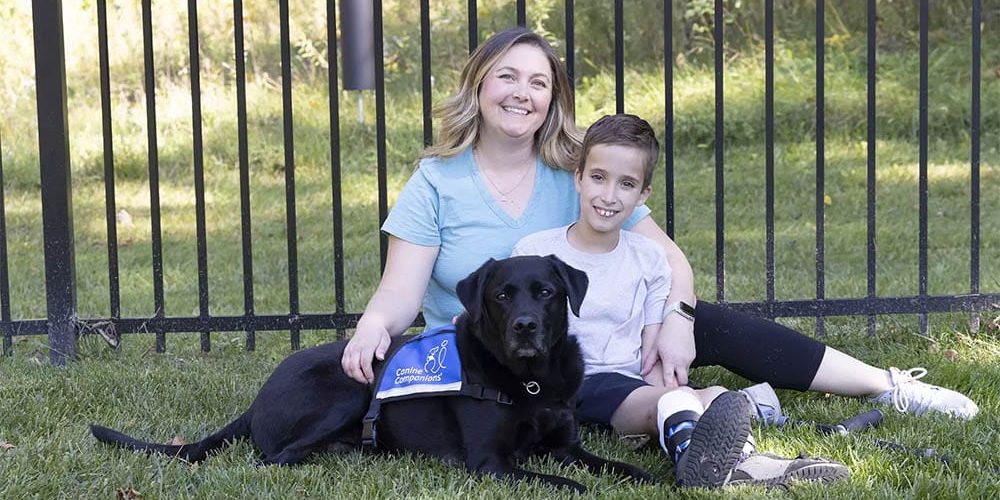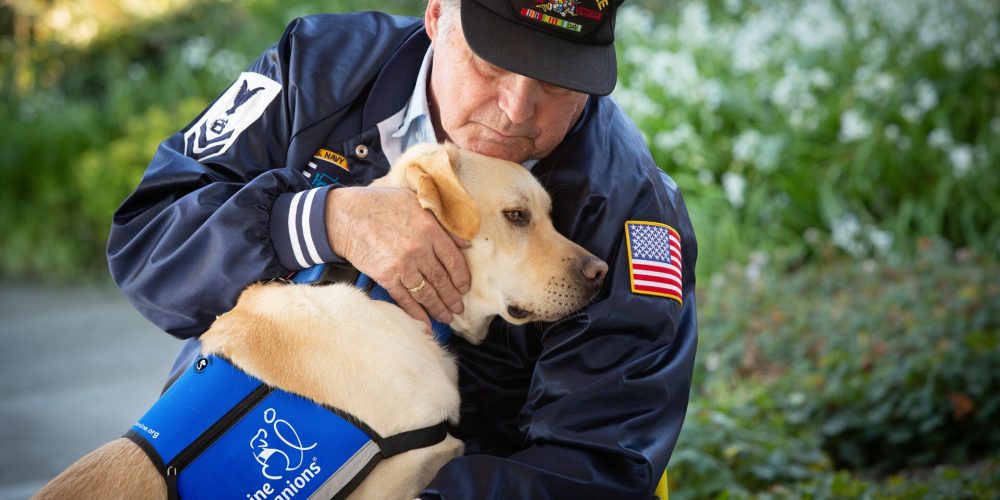Home » Service Dogs » Our Dogs » Who We Serve
Who We Serve
Learn More about Canine Companions Service Dogs
Canine Companions® service dogs are partnered with adults, children and veterans to assist with daily tasks and increase independence by reducing reliance on other people.
A service dog can retrieve dropped items, push buttons for elevators or automatic doors, and even assist with making purchases. Some service dogs assist people who are deaf or hard of hearing by alerting partners to key sounds such as the sound of a doorbell, alarm clock, someone calling a name or a smoke alarm. Other service dogs assist veterans with physical disabilities as well as post-traumatic stress disorder (PTSD), trained in tasks including anxiety and nightmare interruption, turning on lights, retrieving items, and supporting their handler in crowded public situations.

Adults

Adults with physical or auditory disabilities may be placed with a service dog. A Canine Companions service dog not only assists with physical tasks or alerting to important sounds in the environment but also provides meaningful companionship.
Physical tasks include retrieving dropped items, turning on lights, pulling a manual wheelchair and opening doors. Service dogs for clients who are deaf or hard of hearing are trained to alert to timers, alarms, doorbells and other sounds the client can customize to meet their needs.
Applicants must be at least 18 years old. If the disability is due to an injury, applicants must be one-year post-injury. Examples of the disabilities served are deafness, spinal cord injury, multiple sclerosis, spina bifida, arthritis and cerebral palsy.
As an adult, in order to be eligible for a service dog, applicants must:
- Have a physical or auditory disability
- Be 18 years of age or older
- Be able to navigate their environment without the assistance of others*
- Be able to demonstrate the ability to safely and effectively control, manage and care for a dog*
- Have adequate vision to observe, intervene and manage a dog’s behavior (generally equivalent to DMV license requirements)
- Be willing to attend a two-week Team Training class at a Canine Companions training center
*Adults that are not able to safely manage and care for a dog on their own may be placed with a dog with the assistance of a facilitator such as a spouse or caregiver who lives in their home.
Children

Children aged five or older are placed with service dogs trained to perform physical tasks like retrieving dropped items, applying deep pressure, opening doors and more, under the guidance of the facilitator. The facilitator is typically a parent or caregiver who handles and cares for the service dog, encourages a strong bond between the client and the service dog, and is responsible for the customized training needs of the dog.
A Canine Companions service dog is bred to be calm, reliable and affectionate, and may assist the recipient in completing simple daily tasks at home. Our dogs can also serve as a social bridge to the public. Not only does this kind of assistance make their physical lives easier, but it also boosts confidence and independence. Examples of disabilities served are cerebral palsy, muscular dystrophy, autism and Down syndrome. Service dogs placed with children can:
- Perform service dog tasks including picking up items, opening doors and drawers, and providing calming pressure across the recipient’s lap or body
- Assist with developing independent living skills
- Be integrated into structured therapies and to facilitate social interactions
- Make the recipient’s physical life easier, boost their confidence, as well as their feelings of self-sufficiency and responsibility.
As a child, in order to be eligible for a service dog, applicants must:
- Be at least 5 years of age
- Have a physical or developmental disability
- Live with facilitator
- Be willing to attend a two-week Team Training class at a Canine Companions training center
Facilitator must:
- Be 18 years of age or older
- Be able to demonstrate the ability to safely and effectively control, manage and care for a dog
- Have adequate vision to observe, intervene, and manage a dog’s behavior (generally equivalent to DMV license requirements)
- Be willing to attend a two-week Team Training class at a Canine Companions training center
- Be willing to participate in ongoing Canine Companions training and graduate support program
Veterans

Veterans may be partnered with any type of service dog, including service dogs for post-traumatic stress disorder (PTSD). These service dogs are trained in tasks including anxiety and nightmare interruption, turning on lights, retrieving items, and supporting their handler in crowded public situations that might provoke anxiety for individuals with PTSD. Applicants for the PTSD program must be United States Armed Forces veterans.
Click here for more information about service dogs for veterans.
As a veteran, in order to be eligible for a service dog, applicants must:
- Have a physical or auditory disability, or be veterans of the United States Armed Forces diagnosed with PTSD and able to provide a copy of their DD-214
- Be 18 years of age or older
- Be able to navigate their environment without assistance from others*
- Be able to demonstrate the ability to safely and effectively control, manage and care for a dog*
- Have adequate vision to observe, intervene and manage a dog’s behavior (generally equivalent to DMV license requirements)
- Be willing to attend a two-week Team Training class at a Canine Companions training center
- Be willing to participate in ongoing Canine Companions training and graduate support program
Canine Companions service dogs and follow-up services are free of charge.
Questions? Check out our FAQ by clicking here.
The process to receive a Canine Companions service dog includes multiple steps. Click the button below to start the process to receive more information.
Please note:
Canine Companions does not train or place dogs for the following: to do guide work for the blind, to do seizure or diabetic alert/response, to anticipate or detect medical symptoms, for the primary benefit of emotional comfort or social support, to recognize and/or manage undesirable human behavior, to provide supervision, navigation, or safety from environmental hazards, to respond aggressively or to provide personal protection.
